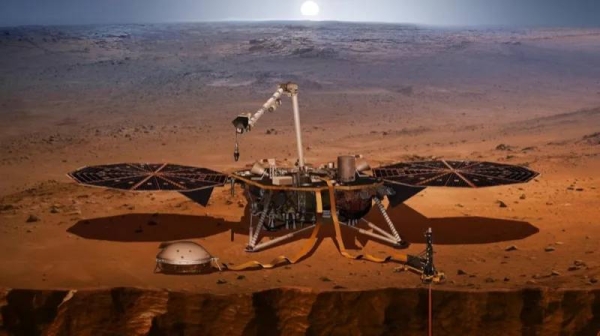Scientists have made a groundbreaking discovery on Mars by finding a reservoir of liquid water deep within the rocky outer crust of the planet. This discovery was made through a detailed analysis of data collected by Nasa’s Mars Insight Lander, which had been stationed on the planet since 2018. The lander carried a seismometer that recorded vibrations, Mars quakes, for four years, providing valuable insight into the planet’s movements. The seismic signals detected by the analysis indicated the presence of liquid water on Mars, a first-time finding on the planet.
The results of this research have been published in the Proceedings of the National Academy of Sciences. The Insight Lander’s mission came to an end in December 2022, during which it recorded over 1,319 quakes on Mars. By measuring the speed of seismic waves, scientists were able to determine the materials they were moving through. This method is commonly used on Earth to locate water, oil, and gas underground. The analysis identified reservoirs of water at depths ranging from six to 12 miles in the Martian crust, shedding light on the planet’s water cycle and evolution.
Lead researcher Dr. Vashan Wright from UC San Diego’s Scripps Institution of Oceanography highlighted the importance of understanding the Martian water cycle, as it plays a crucial role in the planet’s climate, surface, and interior evolution. Professor Michael Manga from the University of California, Berkeley emphasized the significance of water in shaping a planet’s evolution. The discovery of liquid water on Mars provides answers to long-standing questions about the disappearance of water on the planet over the past three billion years. Despite Mars being a desert, the recent findings hint at the presence of significant underground water reserves.
The location of the Martian groundwater being 10-20km deep in the crust poses challenges for potential colonization plans by billionaires like Elon Musk. Prof. Manga pointed out that drilling a hole 10km deep on Mars would be a formidable task. The discovery of liquid water on Mars opens up new possibilities for the search for potential habitable environments and evidence of life on the planet. Prof. Manga emphasized the crucial role of liquid water in supporting life, indicating that habitable environments on Mars could now be found deep underground. The researchers suggest that similar reservoirs of liquid water may exist across Mars, potentially forming a layer over the surface more than half a mile deep.
The findings of this study have significant implications for our understanding of Mars’ geological and environmental history. The presence of liquid water on the planet offers valuable insights into its evolution and the possible existence of habitable zones beneath the surface. The research highlights the importance of continued exploration of Mars to unravel its mysteries and uncover potential signs of life. With ongoing advancements in technology and space exploration, further discoveries on Mars are expected to deepen our understanding of the Red Planet and its potential for future exploration.











